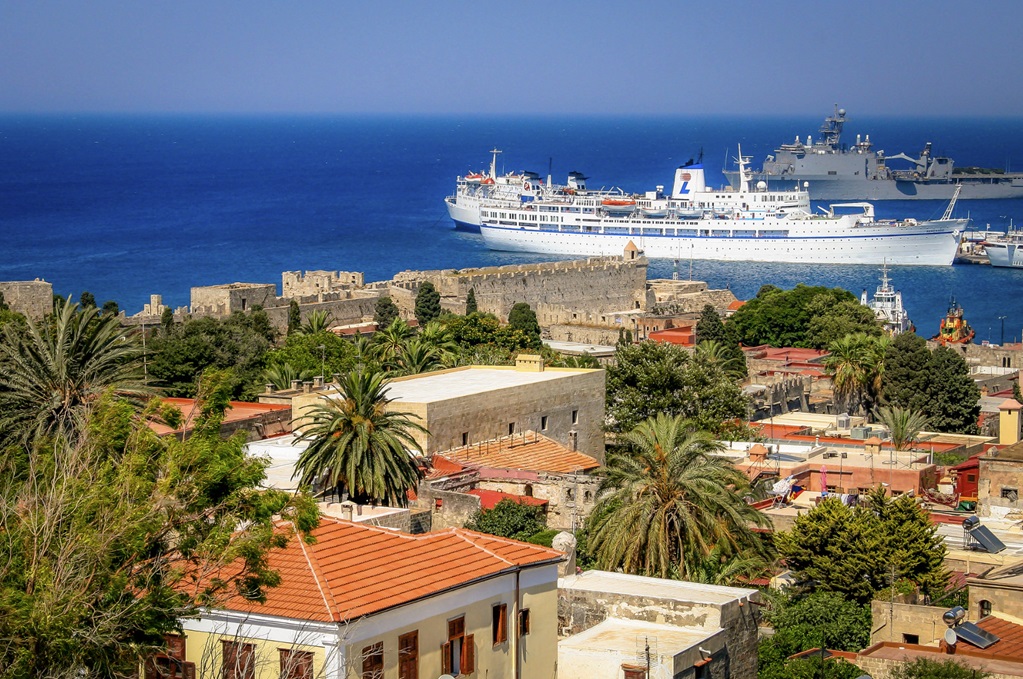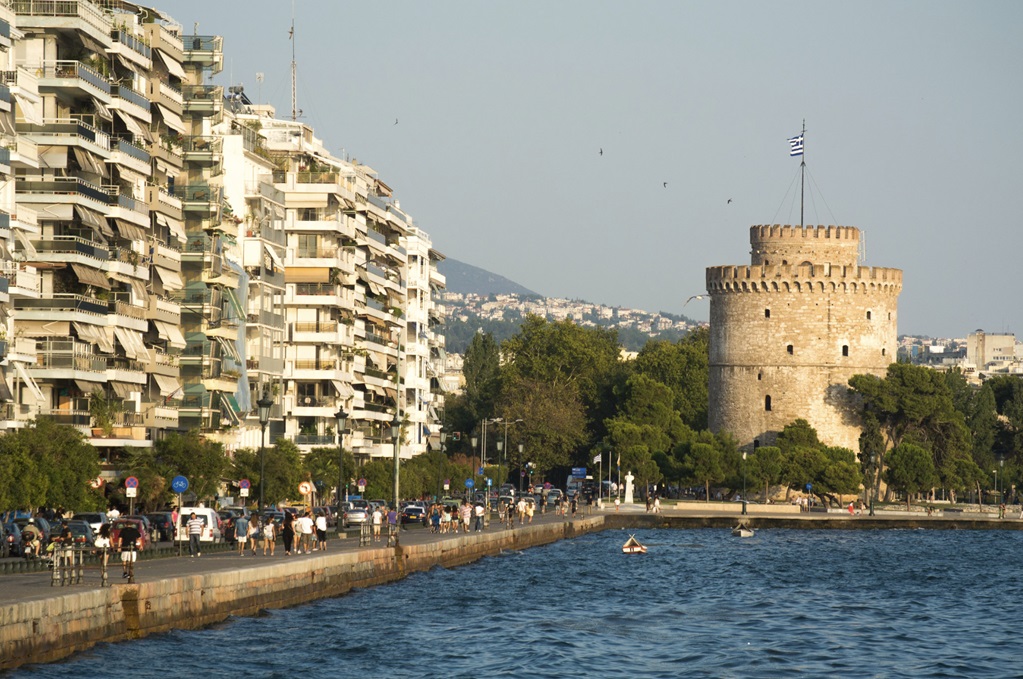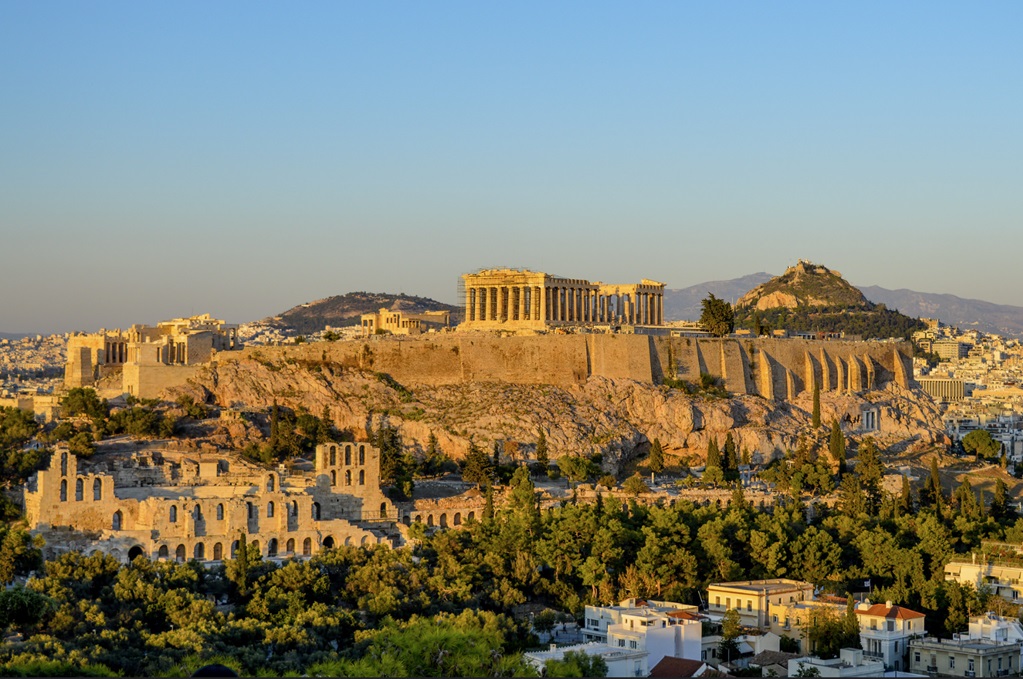Greece travel: Can you still travel there and what are the rules during lockdown?
Ktimatoemporiki Real Estate - 2020-11-07

British tourists flocked to Greece in droves after the country reopened its borders on 15 July, soaking up its Mediterranean lifestyle and enjoying the beauty of its islands.
But a spike in cases, as well as a number of tourists testing positive for coronavirus on their return, led the government to kick a handful of Greek islands off the “safe” list.
The Greek mainland has so far managed to stay on the travel corridors list, while many of the islands have also been reinstated.
But new lockdowns in both England and Greece threaten travel possibilities once more.
So, what does all this mean for British travelers keen for a fix of Grecian sun?
Here’s everything you need to know.
Am I allowed to travel to Greece from the UK?
Until recently, mainland Greece and the most popular Greek islands - Crete, Lesvos, Santorini, Serifos, Tinos, and Zakynthos - were on the Foreign Office’s (FCDO) safe list.
However, under the rules of England’s month-long lockdown, from 5 November-2 December, all non-essential international (and domestic) travel from England is banned. The only exceptions are those traveling for work or education purposes, or for a small number of other “legally permitted” reasons.
Non-essential international travel from Wales is also banned during its “firebreak” lockdown, which runs until 9 November,
Scotland has its own rules around travel, with different restrictions depending on what “tier” your region is in. Find out more here.
Northern Ireland advice states, “You should avoid all unnecessary travel”, but international travel is not formally prohibited.
How could I get there?
Air links with the UK resumed from 15 July, but some airlines will undoubtedly be cancelling flights during lockdown. EasyJet has already said it will be cutting almost all services from England until 2 December.
Ryanair, British Airways, Wizz Air and Aegean Airlines all offer flights to various Greek destinations, and have not yet said they will be making mass cancellations to their schedules. However, this may change, especially considering the announcement that Greece is about to impose its own national lockdown.
What are Greece’s new lockdown rules?
Under the new countrywide restrictions, which come into effect at 6am on Saturday 7 November and last for three weeks (until 30 November), all retail businesses will be shut with the exception of supermarkets and pharmacies.
Tourists can leave only for medical reasons (eg visiting a doctor or a pharmacy), shopping for essentials, going to the bank (only if the transaction is not possible online) or physical exercise outdoors.
You need to “self-certify” by writing a note explaining your reason for being outside, and show it to the authorities when requested.
Primary schools will stay open, but secondary schools will shut.
Will they let me in when I arrive?
Currently yes, although with some stipulations. The Greek Embassy in London says: “Passengers entering Greece by air are required to present a negative molecular test result for Covid-19, performed up to 48 hours before their entry to Greece.”
This will be at the traveller’s expense. A molecular test usually involves a nasopharyngeal swab. A PCR test (as used by the NHS standard test) is acceptable; The Independent is seeking confirmation from the Greek Embassy about whether a LAMP test (as conducted at Heathrow airport) is also acceptable.
Travellers must complete an online Passenger Locator Form (PLF) at least 24 hours before their arrival in Greece. The form is online, and in English.
The Foreign Office has warned that if you don’t fill in the form before you travel, it “may result in your carrier not allowing you to travel, a €500 fine on arrival or the Greek authorities not allowing you to enter the country”.
If you’re travelling as a household, you only need to fill in one form with details of all the adults and children included. Additional family members can be added to the top of the form before you hit submit. Otherwise each adult over 18 will have to fill in their own form, for example if you’re travelling with a group of friends.
Some airlines will ask for separate forms for every adult, and you should check with your carrier before you travel to see if that’s the case.
Once you have completed the form, you will receive an email acknowledgement and, in a separate email, a QR code. This code is likely to be sent up to 24 hours before travel, regardless of how early the form is filled in.
When you receive your code, either print it or ensure you can display it on your mobile phone.
You will need to show your code to Greek authorities on your arrival into the country, and some airlines may also ask to see it before they let you board.
There have been multiple cases of passengers being denied boarding because they did not fill in the PLF or didn’t fill it in “correctly”. A British mother of two was denied boarding by easyJet on a flight to Greece because the airline claimed she had not filled in the forms properly, while travellers were turned away by Wizz Air for failing to fill in their middle names on the form – even though the form said this was “optional”.
When you arrive in Greece, the authorities will scan the QR code and may direct you for health screening (including testing for coronavirus).
If you are travelling by ferry to Greece, the ferry operator will ask you to complete an additional form (‘Pre Boarding Information’), alongside your PLF. This additional form will be provided by the ferry operator, either via their website, or at booking offices: you should contact them directly if you need further information. Temperature checks may also be carried out before boarding.
If you are travelling overland into Greece, you will need to provide a negative Covid test result – obtained up to 72 hours prior – to authorities upon arrival.
Additional rules may apply if you’re not travelling from the UK or if you’re not a British passport holder.
Will I have to quarantine when I arrive?
Possibly.
According to the FCDO, the Greek authorities may require you to undergo testing for coronavirus as part of a health screening when you arrive in Greece. Any passenger may be asked to undergo a test, but you are more likely to be asked if you’ve arrived from a country outside of the EU (including the UK), either directly or via indirect flights.
After testing, you’ll need to self-isolate at the address given on your PLF form until you receive the results, which should be available within 24 hours. You should also self-monitor to check whether you’re showing any symptoms of coronavirus.
If your test is negative, you will no longer need to self-isolate. If your test result is positive, the Greek authorities are likely to ask you to quarantine for 14 days. Depending on the nature of your accommodation, you may be instructed to move to government-provided accommodation, the costs of which will be paid by the Greek authorities.
Be aware that even if you don’t have coronavirus, you may be asked to self-isolate if someone else from your flight tests positive.
Will I have to quarantine when I come home?
It all depends on where you live in the UK and where you want to travel to Greece.
England, Wales and Northern Ireland are currently following the UK government’s advice – at the moment, only the island of Mykonos is excluded from the travel corridors list, which means you will be subject to a two-week quarantine on your return from there.
Travel to other islands and the Greek mainland is currently fine and there’s no need to self-isolate when you come back - although this could change at any time.
As for those living in Scotland, travel to any part of Greece, whether it’s the mainland or the islands, won’t require a 14-day quarantine when you return.
Can I travel within Greece including between the Greek islands?
It depends. Flights are operating within the country, and traveling throughout Greece, including the islands, has been permitted since 25 May.
However, as part of the country’s new three-week lockdown, all non-essential travel is likely to be prohibited. At the moment, regions are classed as A, B, or C depending on local coronavirus rates, with “a ban on local and domestic flights into or out of airports in the region/s” that have been categorized as risk level C. The rest of the country could follow suit under national lockdown.
If you’re traveling via ferry, you will need to complete a health questionnaire and hand it to the ferry operator before boarding, according to the FCDO. “The necessary forms will be provided by the operator: you should contact them directly if you need further information. Temperature checks may also be carried out before boarding; and it is obligatory to wear masks on all ferries, whose capacity is limited to allow for social distancing.”
Are hotels open?
Hotels are permitted to open, but many may shut during lockdown - if you’re booked to stay somewhere, check before you travel.
Are restaurants, shops, and attractions open?
All attractions and non-essential shops will be closed during the lockdown.
Restaurants, fast-food joints, and cafes will be shut barring takeaway and delivery services.
What rules and restrictions are in place?
At present, it is mandatory to wear a mask in all public places (both indoors and outdoors), in all areas of Greece.
During the lockdown, residents and visitors will be required to stay indoors as much as possible, and must only venture outside for “essential” reasons; they will need a permit to go outdoors.
Source: independent.co.uk
But a spike in cases, as well as a number of tourists testing positive for coronavirus on their return, led the government to kick a handful of Greek islands off the “safe” list.
The Greek mainland has so far managed to stay on the travel corridors list, while many of the islands have also been reinstated.
But new lockdowns in both England and Greece threaten travel possibilities once more.
So, what does all this mean for British travelers keen for a fix of Grecian sun?
Here’s everything you need to know.
Am I allowed to travel to Greece from the UK?
Until recently, mainland Greece and the most popular Greek islands - Crete, Lesvos, Santorini, Serifos, Tinos, and Zakynthos - were on the Foreign Office’s (FCDO) safe list.
However, under the rules of England’s month-long lockdown, from 5 November-2 December, all non-essential international (and domestic) travel from England is banned. The only exceptions are those traveling for work or education purposes, or for a small number of other “legally permitted” reasons.
Non-essential international travel from Wales is also banned during its “firebreak” lockdown, which runs until 9 November,
Scotland has its own rules around travel, with different restrictions depending on what “tier” your region is in. Find out more here.
Northern Ireland advice states, “You should avoid all unnecessary travel”, but international travel is not formally prohibited.
How could I get there?
Air links with the UK resumed from 15 July, but some airlines will undoubtedly be cancelling flights during lockdown. EasyJet has already said it will be cutting almost all services from England until 2 December.
Ryanair, British Airways, Wizz Air and Aegean Airlines all offer flights to various Greek destinations, and have not yet said they will be making mass cancellations to their schedules. However, this may change, especially considering the announcement that Greece is about to impose its own national lockdown.
What are Greece’s new lockdown rules?
Under the new countrywide restrictions, which come into effect at 6am on Saturday 7 November and last for three weeks (until 30 November), all retail businesses will be shut with the exception of supermarkets and pharmacies.
Tourists can leave only for medical reasons (eg visiting a doctor or a pharmacy), shopping for essentials, going to the bank (only if the transaction is not possible online) or physical exercise outdoors.
You need to “self-certify” by writing a note explaining your reason for being outside, and show it to the authorities when requested.
Primary schools will stay open, but secondary schools will shut.
Will they let me in when I arrive?
Currently yes, although with some stipulations. The Greek Embassy in London says: “Passengers entering Greece by air are required to present a negative molecular test result for Covid-19, performed up to 48 hours before their entry to Greece.”
This will be at the traveller’s expense. A molecular test usually involves a nasopharyngeal swab. A PCR test (as used by the NHS standard test) is acceptable; The Independent is seeking confirmation from the Greek Embassy about whether a LAMP test (as conducted at Heathrow airport) is also acceptable.
Travellers must complete an online Passenger Locator Form (PLF) at least 24 hours before their arrival in Greece. The form is online, and in English.
The Foreign Office has warned that if you don’t fill in the form before you travel, it “may result in your carrier not allowing you to travel, a €500 fine on arrival or the Greek authorities not allowing you to enter the country”.
If you’re travelling as a household, you only need to fill in one form with details of all the adults and children included. Additional family members can be added to the top of the form before you hit submit. Otherwise each adult over 18 will have to fill in their own form, for example if you’re travelling with a group of friends.
Some airlines will ask for separate forms for every adult, and you should check with your carrier before you travel to see if that’s the case.
Once you have completed the form, you will receive an email acknowledgement and, in a separate email, a QR code. This code is likely to be sent up to 24 hours before travel, regardless of how early the form is filled in.
When you receive your code, either print it or ensure you can display it on your mobile phone.
You will need to show your code to Greek authorities on your arrival into the country, and some airlines may also ask to see it before they let you board.
There have been multiple cases of passengers being denied boarding because they did not fill in the PLF or didn’t fill it in “correctly”. A British mother of two was denied boarding by easyJet on a flight to Greece because the airline claimed she had not filled in the forms properly, while travellers were turned away by Wizz Air for failing to fill in their middle names on the form – even though the form said this was “optional”.
When you arrive in Greece, the authorities will scan the QR code and may direct you for health screening (including testing for coronavirus).
If you are travelling by ferry to Greece, the ferry operator will ask you to complete an additional form (‘Pre Boarding Information’), alongside your PLF. This additional form will be provided by the ferry operator, either via their website, or at booking offices: you should contact them directly if you need further information. Temperature checks may also be carried out before boarding.
If you are travelling overland into Greece, you will need to provide a negative Covid test result – obtained up to 72 hours prior – to authorities upon arrival.
Additional rules may apply if you’re not travelling from the UK or if you’re not a British passport holder.
Will I have to quarantine when I arrive?
Possibly.
According to the FCDO, the Greek authorities may require you to undergo testing for coronavirus as part of a health screening when you arrive in Greece. Any passenger may be asked to undergo a test, but you are more likely to be asked if you’ve arrived from a country outside of the EU (including the UK), either directly or via indirect flights.
After testing, you’ll need to self-isolate at the address given on your PLF form until you receive the results, which should be available within 24 hours. You should also self-monitor to check whether you’re showing any symptoms of coronavirus.
If your test is negative, you will no longer need to self-isolate. If your test result is positive, the Greek authorities are likely to ask you to quarantine for 14 days. Depending on the nature of your accommodation, you may be instructed to move to government-provided accommodation, the costs of which will be paid by the Greek authorities.
Be aware that even if you don’t have coronavirus, you may be asked to self-isolate if someone else from your flight tests positive.
Will I have to quarantine when I come home?
It all depends on where you live in the UK and where you want to travel to Greece.
England, Wales and Northern Ireland are currently following the UK government’s advice – at the moment, only the island of Mykonos is excluded from the travel corridors list, which means you will be subject to a two-week quarantine on your return from there.
Travel to other islands and the Greek mainland is currently fine and there’s no need to self-isolate when you come back - although this could change at any time.
As for those living in Scotland, travel to any part of Greece, whether it’s the mainland or the islands, won’t require a 14-day quarantine when you return.
Can I travel within Greece including between the Greek islands?
It depends. Flights are operating within the country, and traveling throughout Greece, including the islands, has been permitted since 25 May.
However, as part of the country’s new three-week lockdown, all non-essential travel is likely to be prohibited. At the moment, regions are classed as A, B, or C depending on local coronavirus rates, with “a ban on local and domestic flights into or out of airports in the region/s” that have been categorized as risk level C. The rest of the country could follow suit under national lockdown.
If you’re traveling via ferry, you will need to complete a health questionnaire and hand it to the ferry operator before boarding, according to the FCDO. “The necessary forms will be provided by the operator: you should contact them directly if you need further information. Temperature checks may also be carried out before boarding; and it is obligatory to wear masks on all ferries, whose capacity is limited to allow for social distancing.”
Are hotels open?
Hotels are permitted to open, but many may shut during lockdown - if you’re booked to stay somewhere, check before you travel.
Are restaurants, shops, and attractions open?
All attractions and non-essential shops will be closed during the lockdown.
Restaurants, fast-food joints, and cafes will be shut barring takeaway and delivery services.
What rules and restrictions are in place?
At present, it is mandatory to wear a mask in all public places (both indoors and outdoors), in all areas of Greece.
During the lockdown, residents and visitors will be required to stay indoors as much as possible, and must only venture outside for “essential” reasons; they will need a permit to go outdoors.
Source: independent.co.uk







